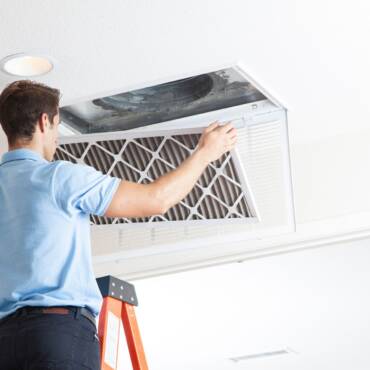HVAC systems can be quite complex. Regardless of the type of system you have, there are many moving parts that must be perfectly in sync for the whole thing to function properly. There’s no doubt that a capacitor is one of the most important parts for the functionality of an AC system. Most systems have two capacitors: a start capacitor and a run capacitor. While relatively small, a start capacitor is a part that singlehandedly gets your AC unit going. It provides the power to jumpstart the motor and get the fan blade turning. Once the motor starts, the run capacitor takes over to provide jolts of power to keep the motor going. While there are two different capacitors, the start capacitor tends to fail more often. If either capacitor begins to act up, it can be catastrophic for the functionality of your entire system.
Here are the warning signs to look out for if your capacitor is beginning to fail:
Weak Voltage
If the power levels inside the capacitor, also called microfarads, get too weak, the capacitor will stop working. The voltage levels need to maintain their strength in order to provide enough power to start the motor. When the voltage levels drop too low, there isn’t enough power to start the motor.
Sometimes, a capacitor can short out, resulting in a total loss of voltage. This will also prevent the AC unit from starting as normal.
Rusted Terminals
With an AC unit sitting outside in the elements, rust is always a factor. If the terminals on the capacitor get rusted, it can result in the loss of power to the motor. Look at the outside of your capacitor, which can usually be found attached to the outside of your AC unit. If it looks significantly rusted, this could be your issue.
Oil Leaking
Oil is present inside a capacitor. It’s two main purposes are to remove air and to help regulate the temperature inside the capacitor. If you notice oil leaking out of the capacitor, it likely won’t be able to work as intended. The correct level of oil is needed for the functionality to remain intact.
Wear & Tear
Excessive heat is one of the most common reasons why a capacitor stops working. AC units in warmer climates, like we have here in Florida, are more at risk of failure due to the heat. Keeping your AC unit shaded can help extend the life of the capacitor and the entire unit itself.
A capacitor will last about 20 years, depending on outside factors like climate. If your capacitor is aging, it’s smart to have it inspected to catch any issues before they manifest into a serious problem.
If you suspect your capacitor has failed, there are a few things you can do to validate your suspicions. First, listen for a humming sound. If there is a faint hum, but the unit won’t turn on, try taking a long, skinny stick and manually turning the unit’s fan blade. If the unit starts up as normal, that’s a sign the start capacitor isn’t working. It’s okay, there’s no need to panic. If you suspect this is the case, contact our team at Charlie’s Tropic Heating and Air Conditioning and we can send a member of our team to inspect it as soon as possible.
Whether you require installation, repair, or maintenance, our technicians will assist you with top-quality service at any time of the day or night. Take comfort in knowing your indoor air quality is the best it can be with MOE heating & cooling services Ontario's solution for heating, air conditioning, and ventilation that’s cooler than the rest.
Contact us to schedule a visit. Our qualified team of technicians, are always ready to help you and guide you for heating and cooling issues. Weather you want to replace an old furnace or install a brand new air conditioner, we are here to help you. Our main office is at Kitchener but we can service most of Ontario's cities
Source link



Add Comment